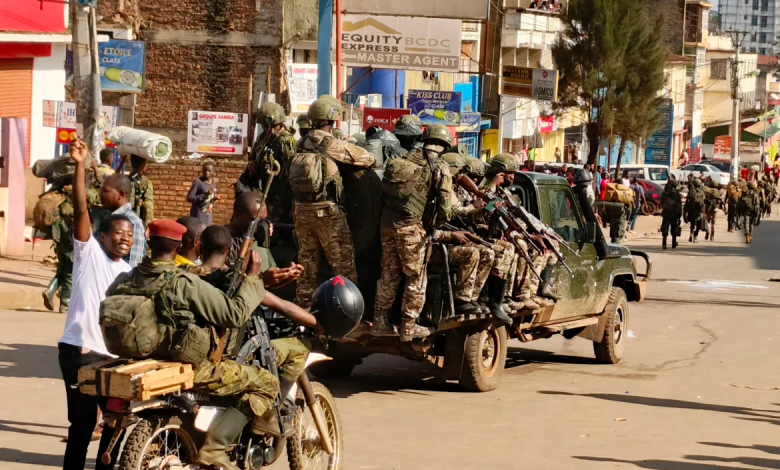Rwanda-Backed M23 Rebels Accused of Executing Children in DR Congo
The United Nations High Commissioner for Human Rights has condemned the violations of human rights by the M23 rebels.

The Rwanda-backed M23 rebels are allegedly executing children and committing atrocities, causing massive displacement of persons from Bukavu, a town in the Democratic Republic of Congo (DR Congo).
The United Nations High Commissioner for Human Rights in a statement on Tuesday, Feb. 18, condemned the violations of human rights such as the summary execution of children and sexual violence linked to the conflict by the M23 rebels. Hospitals and humanitarian facilities are also being attacked by the rebels.
“We call on Rwanda and the M23 to ensure the respect of human rights and international humanitarian law. We are also documenting cases of bad treatment, sexist and sexual violence linked to the conflict, the forced recruitment of children, intimidation and threats of death,” Ravina Shamdasani, spokesperson of the UHCHR, said in the statement.
“We have received information on arbitrary arrests and detentions, degrading treatment and the presumed forced return of young Congolese fleeing from violence in neighbouring countries.”
Also, the UN High Commissioner for Human Rights, Volker Turk, called on Rwanda and the M23 rebels to protect all individuals found in the territories they control.
“The violence must stop immediately. All the parties must respect international humanitarian law, in particular, that which concerns the protection of civilians and human rights, and resume dialogue within the context of the Luanda and Nairobi processes. The risks of seeing this situation transformed into a more profound and vast conflict are real and would have more devastating consequences for the civilians,” the High Commissioner warned.
He added that they’ve also received information that journalists, human rights defenders, and members of civil society organisations were threatened and constrained to leave the region while others are still blocked in Bukavu and Goma
Despite calls by the international community and regional organisations, the M23 rebels continued their advance in the South Kivu province, aggravating the security and humanitarian situation in the eastern DR Congo. The resolutions adopted during the joint East African Community (EAC) and the Southern African Development Community (SADC) summit of Feb. 8, are yet to be implemented about two weeks after the Dar-es-Salaam meeting.
Meanwhile, the Belgian government has confirmed that it is re-evaluating its cooperation with Rwanda because of the violation of the territorial integrity of the DR Congo. This announcement comes as Rwanda decided to suspend its programme of bilateral aid with Belgium denouncing it as the politicisation of development.
The Rwandan government insists that it would not be intimidated and justifies its military involvement in the eastern DR Congo, saying it wants to guarantee the security of its borders and fight against the Democratic Forces for the Liberation of Rwanda, a militia group of former Rwandan soldiers implicated in the 1994 genocide, which Rwanda considers as a permanent threat to its national security.
On the other hand, the United Kingdom summoned the Rwandan High Commissioner in London concerning the operations of M23 forces in DR Congo, asking Rwandan authorities to immediately withdraw all its troops from Congolese territory..
“We exhort Rwanda to immediately cease all hostilities and return to dialogue within the context of the peace processes being carried out by Africa,” the British Ministry of Foreign, Commonwealth and Development Office said in a statement.
The M23 rebels, backed by Rwanda, are accused of committing atrocities, including the execution of children, causing significant displacement in the Democratic Republic of Congo (DR Congo).
The United Nations High Commissioner for Human Rights condemned these acts, emphasizing violations such as summary executions and sexual violence.
Calls have been made for the rebels to uphold human rights and international humanitarian law, with concerns also raised about intimidating journalists and human rights defenders.
Despite international appeals, the M23 continues its advance in South Kivu province, exacerbating the humanitarian crisis. Complications are heightened as the Belgian government reviews its relations with Rwanda due to breaches of DR Congo's territorial integrity. Rwanda justifies its military presence by citing border security needs and neutralizing threats from the Democratic Forces for the Liberation of Rwanda. Meanwhile, the UK has urged Rwanda to withdraw its troops and return to peaceful dialogue.
Support Our Journalism
There are millions of ordinary people affected by conflict in Africa whose stories are missing in the mainstream media. HumAngle is determined to tell those challenging and under-reported stories, hoping that the people impacted by these conflicts will find the safety and security they deserve.
To ensure that we continue to provide public service coverage, we have a small favour to ask you. We want you to be part of our journalistic endeavour by contributing a token to us.
Your donation will further promote a robust, free, and independent media.
Donate HereStay Closer To The Stories That Matter




